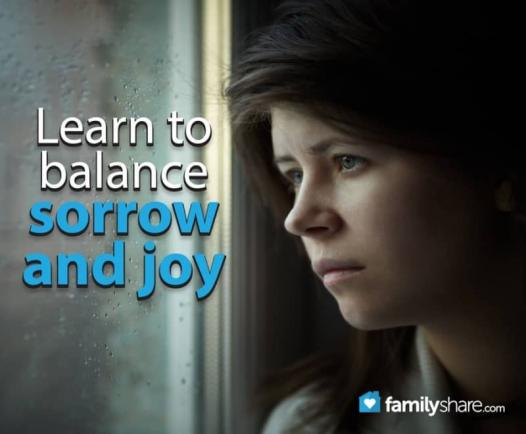
Few emotions are more inevitable in the human experience than grief. Whether due to loss of a loved one or the loss of a skill, dream, or ambition, grief is something that everyone alive will feel at some point.
Often, when we're in the throes of a loss or difficult experience, it can feel like our grief is all-consuming and overwhelming. It can be tough to know how to move forward and easy to feel despair and depression.
It can also be hard to deal with the way those around us handle our grief. It's common for friends and family to encourage us to move on let go of our grief, or simply focus on other things. Many times, such advice only makes a grieving person feel more alone and frustrated with their own inability to move past their sorrow.
Learning to acknowledge our own grief and honor our emotionswithoutdwelling on them or allowing oneself to sink into depression can be a tricky balance. However, developing the ability to balance sorrow and joy in our lives is a vital skill, and one that can help create a rich and beautiful life.
If you're struggling to deal with grief in your own life, remember these tips:
1. Allow yourself to have a hard time
Life can be tough and dealing with a loss or other difficult circumstance can be impossibly overwhelming. It's important to acknowledge your own struggle. Rather than trying to suppress your emotions or just push past them, recognize and honor the fact that grief is a natural response for someone in your situation. Be gentle with yourself and allow yourself the time that you need to grieve.
It's also important to remember that, like any emotion, grief can come and go. You may think that you've put a difficult experience behind you only to find months or, even years later that you're feeling the grief of that situation, again. Understand that healing is a gradual process, and life is filled with natural highs and lows. If you find yourself struggling again after a period of contentment, don't beat yourself up.
2. Be honest with those around you
Few emotions are as isolating as the feelings of grief that accompany a loss or other life trial. When you're in the middle of a difficult experience it can be easy to feel like nobody around you understands your pain.
Being honest with your friends and family. Opening up about what you're experiencing and the sense of grief that you're feeling can help open the doors to powerful healing. Often, your honesty will prompt others to share their own stories of pain and difficulty thus helping to ease the sense of isolation you may feel.
Confiding in those you love can also help them to know how best to extend comfort and compassion. Let your loved ones know how they can help your healing process. Usually, friends and family are anxious to help but don't always know how.
3. Don't let your life revolve around your circumstances
Although it can feel like the trial you're experiencing is all-consuming, it's important to take some time to recognize that your life is made up of more than your loss or frustrating circumstance. Rather than focusing only on the situation that is bringing you grief, try to make some time to focus on other relationships, job, and experiences in your life.
Learning to recognize that your life is bigger than your grief is an important step in being able to heal and move on. Don't forget to have compassion for yourself as you heal. It's very natural for the healing process to take awhile.
The great Jewish writer and Holocaust survivor Elie Wiesel is famous for saying, "It is possible to suffer and despair an entire lifetime and still not give up the art of laughter."� As you work on learning to work through your grief and find joy in your life, remember that grief and laughter aren't necessarily mutually exclusive. It's okay if you feel like you're frequently dealing with conflicting emotions. Like grief itself, contradiction is a natural and normal part of life.
Learning to experience grief in a healthy way, without dwelling on it, can be challenging. However, with patience, compassion, and perspective it's possible to find - as Elie Wiesel did - a balance between grief and laughter.

